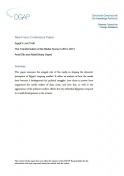These papers began as presentations made at the “New Faces Conferences” hosted in 2013 and 2014 by the EU-Middle East Forum (EUMEF) at the DGAP. EUMEF is a dialogue and exchange platform geared toward young and mid-level professionals from North Africa, Turkey, and EU member states.
Egypt’s Lost Truth: The Transformation of the Media Scene in 2012–2013
Amal Dib and AbdelGhany Sayed give an overview of the highly politicized Egyptian media scene and its power to shape domestic perception of ongoing political struggles. Before, during, and after the so-called Arab Spring, those in power have suppressed the media outlets of their rivals: the forces of political Islam on the one hand and that of Egypt’s old and deep (military) state on the other. A “third” but still weak camp stands at an equal distance from the conflict’s most powerful parties. While it is highly unlikely that the media scene will see improvements in the near future, journalists can nonetheless shape their respective media outlets. By striving to preserve journalistic ethics and standards, by exercising self-criticism, and by giving priority to facts over meta-narratives, conscientious journalists can help cultivate a different discourse, even within the constraints of their politicized outlets. Dib is an Eramus Mundus scholar and PhD candidate at the Institute for Media and Communication Studies at the Freie Universität Berlin, and Sayed is a legal researcher and practicing attorney in Egypt.
Citizenship in Greece: Impossibility for the Second Generation of Migrants
Christos Iliadis, a post-doctoral researcher at Panteion University (Athens), describes the recent debate in Greece over who should be a Greek citizen. A new citizenship code, launched in 2010 by the center-left government, introduced citizenship not only as part of state sovereignty but also as a right for those meeting certain criteria (such as birth to parents legally staying in the country and attending Greek schools for at least six years). By early 2013, key provisions of the law had been ruled unconstitutional by the Supreme Court on the grounds of protecting Greek “national community.” As a result of this ruling, hundreds of thousands of children of migrant origin today lack the right to Greek citizenship and form what Iliadis calls a generation of “impossible citizens.”
Internet-Based Insurgent Citizenship and the Struggle Over Free Speech in “Established” Democracies
Félix Tréguer, a PhD candidate in political science at the School for Advanced Studies in Social Sciences (EHESS) in Paris, describes how practices of “Internet-based insurgent citizenship” are reshaping debates over freedom of expression in established democracies like France. The Internet, with its utopian roots and emphasis on free communication and democratic experiments, has inspired new kinds of “citizenship practices,” some of which operate at the edge of legality, specifically in terms of communications law. Their challenges to the existing power balance between civil society and the state has elicited a range of responses. Tréguer suggests that democracies will not be able to accommodate Internet-based modes of political participation without expanding the legal right to freedom of expression.

